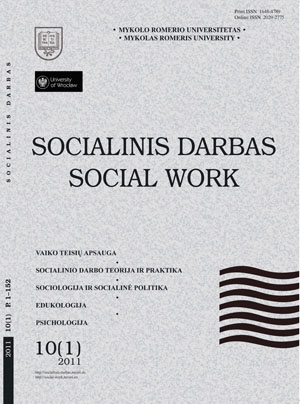Grupinės terapijos elementų taikymo asmenybės saviugdos procese teorinės prielaidos
The Theoretical Assumptions of the Elements of Group Therapy Practice in Self-Educational Process of Personality
Author(s): Valdonė Indrašienė, Aušra KolbergytėSubject(s): Social Sciences
Published by: Mykolas Romeris University
Keywords: a mature personality; self-education; group therapy
Summary/Abstract: Concepts like mature personality, self-education and group therapy are represented in this article, with reference to scientific literature. The purpose of this paper is to reveal the benefit of group therapy in the self-educational process of a personality. Scientists offer many definitions of self-education. Self-education (or self- help) is one of the most effective elements of self-training in individual growth. It consists not only of solving a person’s actual problems but it lays the foundation for forming the stable values and skills for higher maturity and a more responsible attitude toward continual self-training. An analysis of the scientific literature detects a significant advantage of the group therapy in the self-educational process of personality. The atmosphere of group therapy creates an environment to shape new models of behavior which can be adjusted in real life outside the group. The surveys show that group therapy and self-education are identical, which expands the importance to help individuals correct their behavior, thinking and sensibility in order to become a more mature person. Group therapy sets an opening for a more facilitated process of self-education of a person in such fields as self-knowledge, self-expression, forming a value-system, emotional intelligence, socialization, learning from the experience of others.
Journal: Socialinis darbas
- Issue Year: 10/2011
- Issue No: 1
- Page Range: 49-55
- Page Count: 7
- Language: Lithuanian

